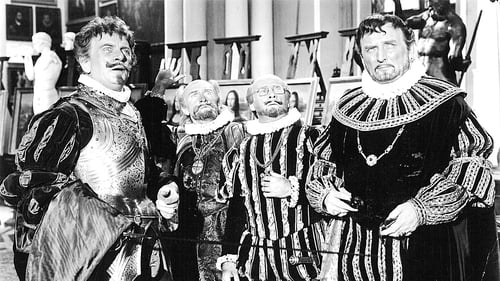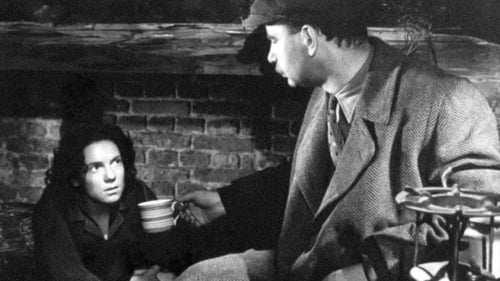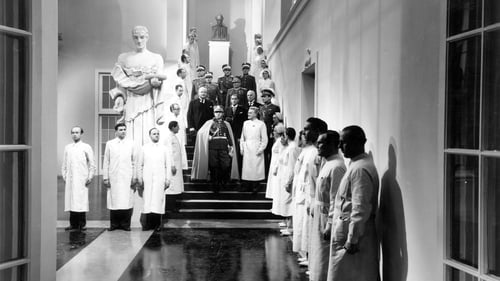Marie Nademlejnská
Nacimiento : 1896-06-27, Prague, Bohemia, Austria-Hungary. [now in Czech Republic]
Muerte : 1974-01-24

Davidka
Basada en textos reales sobre juicios inquisitorios, esta película tiene como argumento el narrar las atrocidades que cometía la Inquisición sobre personas inocentes, y que por alguna razón eran catalogadas como brujas, herejes ó hechiceros.

Captain Martin from the police's child department and his colleague Kraus are called to Znojmo to help solve a case regarding stolen toys found in the town's subterranean passages. The members of the local police department are convinced that the thieves are the well-known "customers" from the Znojmo elementary school, pupils Exner and Mandlík. Martin, however, has doubts about these culprits. These doubts grow even stronger after the local self-service shop is robbed and the local tobacco store reports that it is missing a lot of imported cigarettes. Martin questions the children, inspects both shops and searches through the underground.

sousedka Radačka

(segment "Jak se kalí ocel")
A film in five episodes, all based on an attempt to show the life of young people today, their feelings and relationships, their behaviour in public and private life.

worker

svatebčanka

May 1945. On the outskirts of Prague, ordinary people meet Soviet soldiers-liberators with tears of joy in their eyes. In the early days of the lull, someone sadly recalls a pre-war life; someone unexpectedly meets his love; someone is returning from enemy dungeons looking hopefully into the future; and someone, having moved from a tank into a Czech tram, warmly recalls his craft as a car driver... These days, all those who survived the Great War fire swear an oath to keep peace on Earth forever, honoring the memory of those who gave their lives for simple human happiness.

cleaning woman

Skinny grandmother

Simon's wife
After the battle of Sudoměř the Hussite teaching spreads through the whole country and people start leaving their homes to help build the fortification of Tábor. Prague citizens request help against the army of Zikmund. The Hussite army with Jan Žižka in the lead make their way towards Prague. They fortify themselves on the mountain Vítkov and engage in a bloody battle with Zikmund’s huge army.

housekeeper

clerk miss Vinklářová

Štumpfnágelova žena
Jan Hus is a 1954 Czechoslovak film directed by Otakar Vávra. It is the first part of the "Hussite Revolutionary Trilogy", one of the most famous works of the Czechoslovak director, completed with Jan Žižka (1955) and Proti všem (Against All Odds, 1957).

peas
The happenings in a shoe factory serve as a not very thinly veiled examination of the pros and cons of both socialism and democracy.

Early Days follows the early life of famous Czech writer Alois Jirásek. Jirásek had already developed his own view of the history of the Czech nation while he was at grammar school in Broumov. When he becomes the supply teach in Litomyšl, he has already written his first book and a number of poems. The local dignitaries await the arrival of the young writer in excited anticipation. Jirásek, however, is sickened by the empty patriotism from the depths of his soul and soon becomes disagreeable to the notables. The district sheriff tries to remove Jirásek from the school and drive him out of town. Unable to do this, the sheriff appoints a pro-Austrian headmaster who attempts to sabotage Jirásek. The students stand behind Jirásek , however, and discontent is not only felt in Litomyšl but throughout Bohemia.

Domovnice

Woman Outside Bakery
The Emperor's mismanagement of his country is provoking some in his court to plot to overthrow him. He feels successful, at least, when he discovers the legendary Golem, which he believes can protect him and even cure his imaginary illnesses but, when he disappears while on a bender, his kindly baker, who looks just like him, is mistaken for him, and begins to put things in order. However, the conspirators, not to be outdone, determine to bring the Golem back to life to do their bidding.

Marie's mother
Czech drama film.

Klomínkova zena

Pínkov's woman
The Trap (Czech: Past) is a 1950 Czech drama film directed by Martin Frič. It was entered into the 1951 Cannes Film Festival.

Harazimová

Bílková

Marie Rýdlová
Wild Beasts

People are afraid of the usurer Chazaj and are convinced that he is the bearer of evil. One day Chazaj pays a visit to the poor artist Simon Jordán and asks him to paint his portrait. Simon agrees but as he progresses with the work his mind conjures up terrible thoughts and in the end he commits suicide. The portrait looks lifelike and Chazaj is content with the results. After Chazaj's death the picture changes hands and brings misfortune to all who own it. The last victim is the young painter Roman who buys Chazaj's portrait in a bazaar. He finds a treasure in the frame and begins to live well off it. The comfortable life suits him so well that he rejects his original artistic aims and becomes a painter of fashionable kitsch.

Five crime stories connected by the narration of police superintendent Bartosek.

Czech film tells the story of a border town in World War II. Family members and friends become enemies.

Buresová
After an attack against the guard of the Third Reich, Nazi repression intensifies, and the Czechoslovakian resistance's organized sabotage in an aircraft factory leads to Gestapo shootings.

prostitutka Marion
Inspector Cadek from the 13th police station should keep an eye on the released safe-cracker nicknamed The Cat. He rightly suspects that Cat will go and pick up his last loot which the police didn't manage to find and that he will want revenge on Karta who helped get him behind bars. At the hospital, Cat's ex-lover Fróny hopelessly falls for doctor Chrudimský and decides to start a new life. She still refuses to help the inspector in his search for The Cat and Karta.

Leopold Kohák married a rich widow a long time ago and now has nothing to do compared to his energetic wife. He's growing old and troubled by the fact that he betrayed his first love Emča and his beloved river Sázava where he spent his childhood and youth. A visit from an old friend Lebeda brings it all back to him. After a nervous breakdown Leopold secretly visits his home instead of going to the spa. A wandering tramp suggest Leopold should bathe in the magical waters of the Sázava, and slowly his youth returns to him.

Filoména

Krušná
Mist on the Moors examines fates of just about a few people. Their stories are outlined in a short space of time and are a symbolic representation of the drama of life, struggle for justice, human cognizance and the healing power of love. One of the most important components of the film is the nature, which ceases to be a mere stage for its plot—it serves almost as an autonomous plot agent. The movie landscape is a precisely defined and localized one. Only the South Bohemian ponds can serve as the right environment for development of such earthy and typically human stories as we encounter in the Mist on the Moors.

sestra statkářky

Rich spinster Berta celebrates her sixtieth birthday. Her faithful admirer Dr. Jelinek proposes. But Berta can not forget Edward, the great love of her life, and refuses the offer…

Jitka

Venice Film Festival 1940

žena starosty

The White Plague, a leprosy-like disease, ravages the world during a war. Based on a play by Karel Čapek.

The comedy "Vendelin's Purgatory and Paradise" contains the amusing experiences of the Zemlicka family from Prague who are all trying to find a good match for their daughter Amalka. Amalka is a pretty girl and it comes as no surprise that Vendelin Hrom grows fond of her, having met her and her whole family on a Sunday outing. On the way home they all get wet and so Vendelin is invited to the Zemlicka's house to dry off; he is given dinner and asked to stay the night. The father and mother think up plans to ensnare the timid Vendelin so that they can marry off their daughter.


















